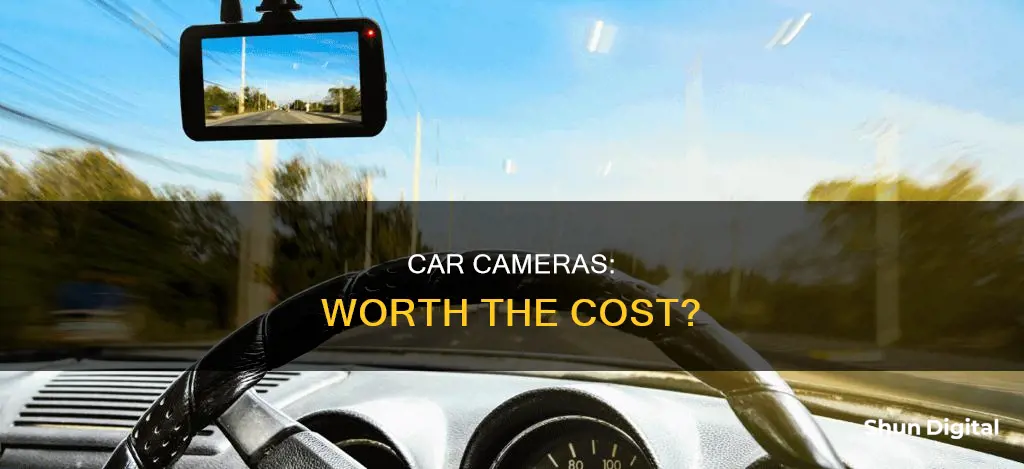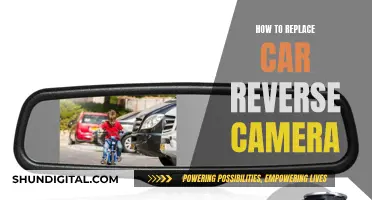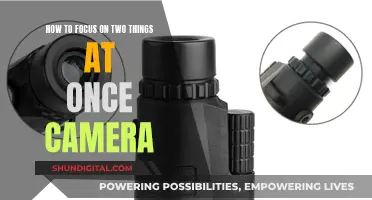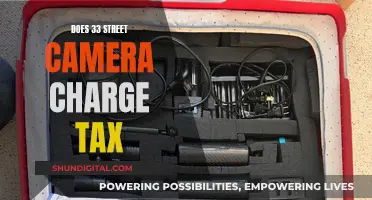
Car cameras, or dashcams, are becoming increasingly popular. They are no longer just for law enforcement or long-haul truck drivers. They are now commonly used in commercial and passenger vehicles, with the market seeing a huge increase in demand. The main purpose of a dashcam is to record incidents in front of the vehicle, but they can also record inside the car and at the rear. They can be a silent witness in the event of a collision, providing video evidence of a traffic accident or violation committed by another motorist. They can also be used to record foul weather incidents, and as a security device when the car is parked. There are many advantages to dashcams, but also some disadvantages.
| Characteristics | Values |
|---|---|
| Purpose | To record video of traffic events like crashes, providing evidence in the event of a collision or insurance fraud. |
| Placement | Mounted on the dashboard, windshield, back of the rearview mirror, or rear window of a vehicle. |
| Recording Capabilities | Depending on the system, dashcams can record incidents in front of, behind, or inside the vehicle. Some also have parking mode, which activates when motion is detected or the car is bumped. |
| Connection | Dashcams with Wi-Fi can store video in the cloud. Dashcams with Bluetooth can interface with a smartphone via an app. |
| Power Source | Dashcams can be battery-powered, or source power from the vehicle's electric system through a power port or hardwiring. |
| Cost | Aftermarket dashcam systems range from $50 to $500. Professional installation can cost up to $150. |
| Video Quality | Dashcams offer HD or 4K capabilities. |
| Storage | Some dashcams have removable SD cards that overwrite old footage. Others record wirelessly and upload footage to cloud storage. |
What You'll Learn

Car cameras can be a silent witness in the event of a collision
Car cameras, or dash cams, can be a silent witness in the event of a collision, providing an unbiased account of events leading to a crash. They can be invaluable in insurance claims and legal proceedings, protecting drivers from false accusations and fraudulent claims. Dash cams can also help parents monitor the driving habits of their teens and provide peace of mind when parking on the street.
Dash cams are small video cameras that are mounted on the dashboard or windshield of a car. They record continuously, capturing everything that happens while driving, including audio and video evidence. This footage can be used to provide an objective record of incidents, such as collisions or traffic disputes, and can be transferred to a smartphone or computer for review.
In the event of a collision, a dash cam can be a driver's silent witness, capturing the untold events and providing evidence to support insurance claims and legal proceedings. The cameras can be set up to automatically record incidents, with some models using G-sensors to detect unusual movements such as sudden braking or a collision, and automatically saving the relevant footage. This ensures that critical footage is not overwritten and provides an impartial account of the incident.
Dash cams are also useful for monitoring teen driving, capturing unexpected events, and providing added security for your vehicle. They can be equipped with motion sensors and impact detection, alerting you if someone hits your parked car. With prices ranging from $50 to over $500, dash cams offer a range of features, including high-definition video, night vision, and audio recording.
While dash cams offer many benefits, there are also some considerations to keep in mind. Privacy is a concern, as any recorded video has the potential to invade the privacy of the driver or other individuals. Additionally, dash cams can be expensive, especially those with advanced features like night vision and parking mode. Furthermore, the storage capacity of dash cams is limited, and they may require additional memory cards to ensure that critical footage is not overwritten.
Overall, dash cams can be a valuable investment, providing peace of mind and a silent witness in the event of a collision. They offer an unbiased account of incidents and can help protect drivers from false accusations and fraudulent claims. With their small size and continuous recording capabilities, dash cams are becoming an indispensable tool for drivers worldwide.
Concealing Surveillance Cameras: Outdoor Strategies for Privacy
You may want to see also

They can help lower insurance premiums
While dash cams don't typically lower insurance premiums directly, they can still positively impact your insurance in several ways.
Evidence for Insurance Claims
Dash cams can provide video evidence of what caused an accident, which can be useful for insurance claims. This footage can help resolve claims or accidents where fault is disputed, and it can also protect you from being found partially at fault in an accident that another driver caused. For example, if you were hit by a texting driver, dash cam footage could help prove that they were at fault.
Fighting Insurance Fraud
Dash cam footage can also help to protect you from insurance fraud, such as staged accidents designed to elicit a fraudulent claims payout. Having a video record of these events could help clear your name and save you thousands of dollars in legal fees and increased insurance premiums.
Monitoring Teen Drivers
Dash cams can also be used to monitor teen drivers, who are considered high-risk motorists and often result in higher insurance premiums. By watching the footage, parents can ensure their teenage driver is following traffic laws, speed limits, and passenger limits, and address any issues before a ticket or accident occurs.
Security and Surveillance
Dash cams can also act as a security camera, providing surveillance when your vehicle is parked. If your car is damaged while parked, such as in the case of theft, vandalism, or a falling tree limb, a dash cam that's hardwired to record even when the car is off could capture these events and provide video evidence to support your insurance claim.
Defeating Red-Light Camera Tickets: Strategies for Success
You may want to see also

They can help monitor young drivers
Car cameras can be a great way to monitor young or new drivers. They can help parents keep an eye on their children's driving behaviour and ensure they are being safe on the roads.
Many car cameras offer a view of the vehicle's interior, which can be useful for parents who want to monitor their child's driving. This can help parents ensure their child is driving safely and not engaging in reckless behaviours such as texting while driving.
Some car cameras also offer features such as speed and over-speeding alerts, which can help parents ensure their child is driving within the speed limit. With a car camera, parents can also review footage of their child's driving and provide feedback to help them improve.
In addition to monitoring driving behaviour, car cameras can also provide valuable evidence in the event of an accident. This can be useful for insurance claims and help parents feel more at ease knowing that they have a record of what happened.
Car cameras with GPS tracking can also help parents know their child's exact location and speed. This can be particularly useful if the child is driving in an unfamiliar area or if the parents want to ensure their child is not driving outside of a certain area.
While there are some disadvantages to car cameras, such as cost and privacy concerns, the benefits can outweigh the negatives for parents who want to monitor their young drivers.
Updating Computer Camera Drivers: Easy Steps for Better Streaming
You may want to see also

They can act as a sentry when the vehicle is parked
Car cameras can act as a sentry when the vehicle is parked, providing peace of mind when you're away from your car. These cameras can be set up to record incidents in and around your car, capturing clear footage of any potential threats. This feature is especially useful for overnight parking, when the risk of vehicle theft and vandalism is higher.
Some car cameras have a parking mode that allows them to keep working even when the vehicle is turned off, providing constant surveillance. This is a great option if you're looking for a car camera to monitor your parked car. When choosing a car camera with a parking mode, it's important to consider the power source, as some cameras may drain your car's battery. Look for cameras that can be hardwired into your vehicle's electrical system or use an external power source, like a battery.
Additionally, features like motion detection and bump sensors can trigger video recording when your parked car is touched or bumped. This ensures that you only capture relevant footage and saves you from having to sift through hours of inactive recording. You can also set up notifications to alert you when your car camera detects motion or unusual activity, so you can take immediate action if needed.
When deciding on a car camera to act as a sentry, it's worth considering the camera's placement. While some cameras can be mounted on the dashboard or windshield, others may need to be installed in a more discreet location to avoid attracting attention. The ideal spot would be close to an outlet or router to ensure a stable internet connection and clear footage.
In terms of cost, car cameras with sentry features can vary in price. Basic models may start at around $50, while more advanced systems with features like night vision, Wi-Fi, and parking monitors can range from $150 to over $500. It's important to weigh your budget and specific needs when making a decision.
Mastering Camera Focus: The Ultimate Guide to Sharp Photography
You may want to see also

They can be used to record road trips
Car cameras can be used to record road trips, allowing you to capture memories and relive the experience. When choosing a car camera for this purpose, it's important to consider the quality of the footage, with a minimum of 1080p full HD at 30fps recommended. A wide-angle lens with 4K resolution will enable you to capture scenic drives in the best quality.
Some additional features to look for include GPS tracking, which will allow you to track your route and revisit landmarks, and an LCD screen, which makes it easier to adjust camera settings. Smart features such as app or cloud connectivity will let you view and save your footage in real time, while voice control will enable you to operate the camera while keeping your hands on the wheel.
When recording your road trip, you can choose to record your entire trip or break it up into clips of the most scenic drives. Voice commands can be used to start and stop recording, and apps and cloud technology allow you to review your footage and adjust your camera settings as needed.
- Garmin Dash Cam Mini 2: This compact camera records in Full HD with HDR, producing sharp footage. It's easy to set up and use, and its small size makes it ideal for discreet recording.
- Vantrue N4: The Vantrue N4 offers 4K resolution, night vision, GPS tracking, and 24-hour parked-car monitoring. It also includes rear and interior cameras for comprehensive coverage.
- Nextbase 622GW: This camera has similar features to the Vantrue N4 but adds Bluetooth and app connectivity, built-in Alexa support, and emergency calling. It's a good choice for cold climates due to its capacitor power supply.
- GoPro HERO6 Black 4K Action Camera: The GoPro HERO6 can be mounted on your car to capture first-person accounts of scenic drives. It's known for its durability, with a plastic housing that can withstand impacts.
Charging VHS Camera Batteries: A Step-by-Step Guide
You may want to see also
Frequently asked questions
Car cameras can be worth it for a multitude of reasons, including having evidence in the event of an accident, challenging traffic violations, and preventing theft.
Car camera systems can range from $50 to $500 or more, depending on the features included.
Car cameras can provide valuable evidence in the event of an accident, help with parking, improve driving habits, and even capture memorable road trip moments.
Some potential disadvantages include the cost of the camera and installation, privacy concerns, and the possibility of becoming a target for theft.
Important features to consider include video quality, storage capacity, impact detection, parking mode, and GPS functionality.







